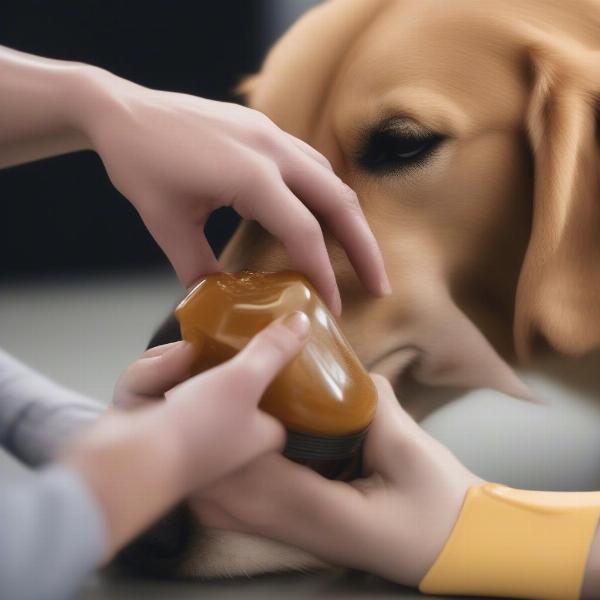Swollen dog paws are a common concern for pet owners. While sometimes a minor issue, paw swelling can also indicate a more serious underlying problem. This article will provide you with several safe and effective swollen dog paws home remedies you can try before rushing to the vet, as well as tips to identify when professional veterinary care is needed. Understanding the potential causes and knowing how to provide initial care can significantly ease your furry friend’s discomfort.
Understanding the Causes of Swollen Paws in Dogs
Several factors can lead to swollen paws in dogs, ranging from minor irritations to serious infections. Identifying the cause is crucial for effective treatment. Common culprits include:
- Allergies: Environmental allergens like pollen, dust mites, or certain foods can trigger allergic reactions, manifesting as swollen paws.
- Injuries: Thorns, glass shards, or sharp rocks can puncture the paw pad, leading to swelling and infection.
- Insect bites and stings: Bee stings, spider bites, and ant bites can cause localized swelling and pain.
- Infections: Bacterial, fungal, or parasitic infections can cause inflammation and swelling in the paw.
- Burns: Hot pavement or exposure to chemicals can burn delicate paw pads.
- Foreign objects: Grass awns, small pebbles, or splinters lodged between the toes can irritate and swell the paw.
Swollen Dog Paws Home Remedy: First Aid and Care
If your dog’s paw is swollen, the first step is to carefully examine the affected area. Look for any visible signs of injury, such as cuts, punctures, or foreign objects. Gently clean the paw with lukewarm water and mild soap. Avoid using harsh chemicals or disinfectants.
-
Cool Compress: Applying a cool compress to the swollen paw can help reduce inflammation and soothe the discomfort. Wrap a few ice cubes in a thin towel and hold it against the affected area for 10-15 minutes at a time.
-
Epsom Salt Soak: Soaking the affected paw in a warm Epsom salt solution can draw out infection and reduce swelling. Dissolve one teaspoon of Epsom salt in a cup of warm water and soak the paw for 15-20 minutes.
-
Honey: Honey has natural antibacterial and anti-inflammatory properties. Apply a thin layer of raw honey to the affected area, covering it with a clean bandage to prevent licking.
 Applying Honey to a Swollen Dog Paw
Applying Honey to a Swollen Dog Paw
- Aloe Vera: Aloe vera gel can soothe irritated skin and promote healing. Apply a small amount of pure aloe vera gel to the swollen area several times a day.
When to Seek Veterinary Care
While home remedies can be helpful for mild paw swelling, it’s essential to seek professional veterinary care if:
- The swelling is severe.
- The paw is bleeding excessively.
- Your dog is limping or showing signs of significant pain.
- The swelling doesn’t improve within 24-48 hours.
- There are signs of infection, such as pus, redness, or a foul odor.
- Your dog has a fever or is lethargic.
Preventing Swollen Paws
Taking preventative measures can help protect your dog’s paws from injury and irritation:
- Regular Paw Checks: Inspect your dog’s paws regularly for any cuts, thorns, or foreign objects.
- Trim Nails: Keep your dog’s nails trimmed to prevent them from catching on objects.
- Paw Protection: Consider using dog booties to protect paws from hot pavement, rough terrain, or harsh chemicals.
- Hygiene: Keep your dog’s paws clean and dry.
Conclusion
Swollen paws in dogs can be caused by various factors, from minor irritations to severe infections. While home remedies like cool compresses, Epsom salt soaks, and honey can be effective for mild cases, it’s crucial to seek veterinary care if the swelling is severe, doesn’t improve, or is accompanied by other symptoms. Regular paw checks, nail trimming, and paw protection can help prevent future paw problems. By being proactive and informed, you can ensure your furry companion’s paws remain healthy and comfortable.
FAQ
- How can I tell if my dog’s paw is infected? Signs of infection include pus, redness, swelling, heat, pain, and a foul odor.
- Can I use human antibiotic ointment on my dog’s paw? No, it’s essential to consult your veterinarian before using any medication on your dog.
- What can I do to prevent my dog from licking his swollen paw? Use an Elizabethan collar or a paw bandage to prevent licking.
- Are certain breeds of dogs more prone to paw problems? Yes, dogs with hairy paws, like Golden Retrievers and Poodles, can be more susceptible to matting and infections.
- How long does it typically take for a swollen paw to heal? Healing time varies depending on the cause and severity of the swelling. Minor irritations may resolve within a few days, while infections may require several weeks of treatment.
- Can grass cause swollen paws in dogs? Yes, grass awns can get lodged between the toes, causing irritation and swelling.
- Is it okay to walk my dog if his paw is swollen? Limit exercise and avoid walking your dog on rough terrain or hot pavement until the swelling subsides.
Looking for more expert advice on dog care? Check out these other helpful articles on our website: [Link to relevant article 1], [Link to relevant article 2], [Link to relevant article 3].
ILM Dog is your trusted source for comprehensive and practical information on all aspects of dog care and well-being. From breed selection and health to training, nutrition, and grooming, our team of experts provides valuable insights and guidance to help you nurture your canine companion. We cover various topics including choosing the right dog breed, understanding dog health and medical care, mastering dog training and behavior, providing optimal nutrition and feeding, ensuring proper hygiene and grooming, and choosing the best products and accessories. Contact us today for personalized advice and resources! Email: [email protected], Phone: +44 20-3965-8624.